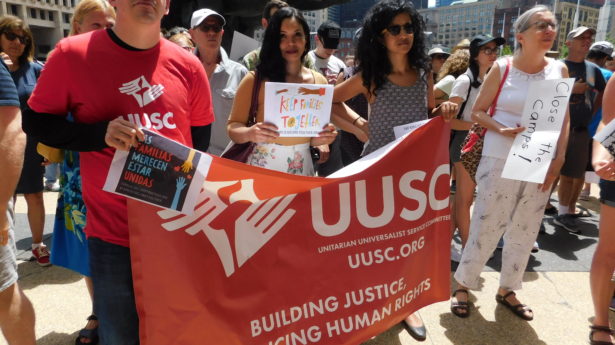The Unitarian Universalist Service Committee advances human rights through grassroots collaborations.
New Trump Admin Policy Undermines Immigrants’ Rights to Due Process

By on July 31, 2019
A Department of Homeland Security (DHS) notice posted in the Federal Register on July 23, 2019 has dangerous and far-reaching implications for the rights of immigrants and people of color. Building off an existing fast-track deportation procedure known as “expedited removal,” the notice would gut the rights of thousands of people in the interior of the United States, denying them recourse to a full hearing of their case before an immigration judge.
Further, by subjecting people to rapid-fire removal decisions, the notice opens the door to even more racial profiling of immigrants, including permanent residents, and U.S. citizens. Under expedited removal, enforcement agencies can deport individuals with no judicial review. If this procedure is applied across the country, millions of people would be forced to prove to DHS that they have been in the country for longer than two years, with no oversight from the courts.
Until this notice went into effect, expedited removal was being applied only to asylum-seekers and migrants encountered within 100 miles of the border and who have been in the country fewer than 14 days. In all the cases where it has been applied so far, however, expedited removal has threatened basic due process protections.
As UUSC staff warned in a 2016 report, “Central American asylum-seekers are [being] placed into fast-track removal proceedings in which the odds are heavily stacked against them.”
In order to obtain relief from deportation under expedited removal, an asylum-seeker must first tell a Customs and Border Protection (CBP) official that they are afraid for their lives. They are then transferred to Immigration and Customs Enforcement (ICE) custody, where they must pass a “credible fear” interview with a U.S. asylum officer.
Only after clearing these hurdles is an asylum-seeker able to present their case in full to an immigration judge—a process that can drag on for months or years, and which now takes even longer than it did in the past, due to the Trump administration’s efforts to remove the ability of immigration judges to close low-priority cases at their own discretion.
Most disturbingly, asylum-seekers have no judicial recourse until after they pass the “credible fear” stage of the expedited removal process—even if their legal rights are violated at an earlier stage. This means, for example, that if CBP deports an individual without acknowledging their claim of fear, this decision would not be reviewed by any third party – whether in the form of an administrative immigration court or a federal court.
Many advocates have pointed out that such a procedure violates Constitutional rights, including the right to due process and the principle of habeas corpus. Yet, in a disturbing 2016 decision, the Third Circuit Court of Appeals responded to this objection by ruling that certain groups of asylum-seekers do not have Constitutional rights. UUSC spoke out against this decision at the time, which directly undermined the rights of asylum-seeking mothers and children held in family detention, as well as many others.
In March, however, the Ninth Circuit Court of Appeals ruled correctly that deporting immigrants without judicial review violates Constitutional rights. This has resulted in a split decision between the two courts, which has created in turn a divided and confusing legal regime. News reports indicate that the Supreme Court will ultimately have to take up the matter of expedited removal in order to resolve these issues.
In the meantime, the ongoing practice of expedited removal is only one of several ways in which the current immigrant system is fundamentally at odds with human rights and U.S. legal traditions. Members of Congress should take action to eliminate expedited removal, while reforming the immigration court system to make it independent of the executive branch of government, and eliminating criminal penalties for harmless border-related offenses.
Any member of the public can also take action against the new expedited removal rule by submitting a comment condemning the notice in the Federal Register. UUSC will continue to speak out against this notice, and we invite our supporters to raise your objections to DHS, in opposition to this latest rights-denying regulatory overhaul.
Photo Credit: iStock – ChuckSchugPhotography
***
About UUSC: Guided by the belief that all people have inherent worth and dignity, UUSC advances human rights globally by partnering with affected communities who are confronting injustice, mobilizing to challenge oppressive systems, and inspiring and sustaining spiritually grounded activism for justice. We invite you to join us in this journey toward realizing a better future!

